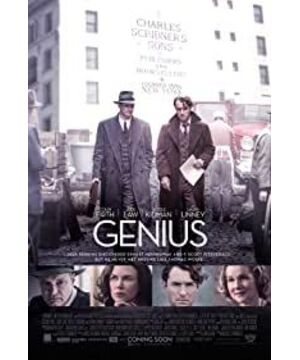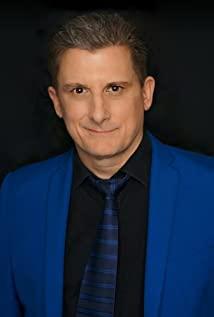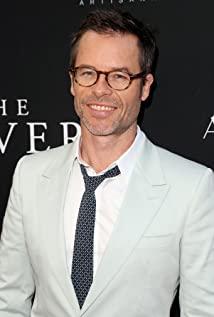The Chinese translation of the film is far less accurate and meaningful than the English one. Although Maxwell is not as good as Hemingway/Fitzgerald/Thomas and other writers with novels that have a carrier of fiction, who is the driving force behind these "genius" writers? Can it be said that he is not a genius of another kind? Now we are familiar with Hemingway's "When the Sun Also Rises", "The Old Man and the Sea", Fitzgerald's "The Great Gatsby" and Thomas "Angel Looked Home", "Time and Drift", these resounding influences American novelists throughout the 20th century are not our focus today, the protagonist today is the editor Maxwell Perkins who unearthed them. Born in 1884, Maxwell showed remarkable and forward-looking writer-digger talent at a very young age, and after a brief stint as a reporter for The New York Times after graduation, he joined Charles Scribner' s Son Press. It was here that he succeeded in propelling Hemingway/Fitzgerald/Thomas from impoverished scholars into popular fried chickens, not only in the literary world and in the United States, but worldwide fame. Publishing houses at the time usually only published works by well-known authors, but Maxwell saw the coming new generation of literature. The first proof of foresight. When Fitzgerald appeared in front of Maxwell with The Romantic Egotist (later renamed This Side of Paradise), Maxwell knew that a new wave of American literature and art had arrived. "The Great Gatsby" put Fitzgerald in the media spotlight, but his profligacy and alcoholism with his wife, Zelda (the woman was incredible) continued to destroy his relationship with Maxwell. Even so, Maxwell remained with and supported Fitzgerald as a friend to the end. At the beginning of the year, Amazon also specially produced the biographical drama "Origin of Zelda" about Fitzgerald and Zelda. Interested friends can go and watch it. All 10 episodes of the first season have been released. Fitzgerald's success did not remove many obstacles for Maxwell, especially Hemingway. Although he was friends with Fitzgerald, Hemingway's style of writing was very different from the former, who was a literary youth. He often used foul language in his works. At that time, Maxwell resisted the company's content conservatives in order to publish "The Sun Also Rises". considerable pressure. Readers who are used to reading traditional literary style works, reading "The Sun Also Rises" will see a whole new world (this is also the first original novel I read), when you see Brett say you know it makes one feel rather Good decision not to be a bitch will give you a feeling of invigorating water. It wasn't until Hemingway's second book, A Farewell to Arms, was published and topped the bestseller list that it sealed the publisher's disapproval and further cemented Maxwell's unshakable position in the writer's digger. But Maxwell As the first person in history to be called a "writer editor", the discovery of potential writers is only the first step. Editing unpolished texts into highly readable works is the real reason why he really deserves this title . Rigorous text control and a sense of structure are the real reasons Maxwell can send classics to the bestseller lists, and this ability is very clearly reflected in his cooperation with Thomas. Thomas lacked the necessary self-control in the choice of words and sentences. He was not as shy as Fitzgerald, nor as straightforward as Hemingway. He was too attached to his own words. He has already cut down nearly 90,000 words. Later, the editing work of "Time and Drift" was as long as 2 years, and Thomas continued to write new content during the editing period. In the process of work, Maxwell also constantly questioned himself, whether the revisions and opinions he made to the writer's words made the work a greater work, or just made it different (to satisfy the reader's needs). curiosity) only? But it turns out that Maxwell was right. It is precisely Maxwell's extraordinary editing talent that made Thomas, who later became famous, more and more mindful of the rumors in the media that "Most of the success of "The Hometown of Angels" and "Time and Drift" is due to Maxwell. more and more. But what makes Maxwell admirable is that he not only has excellent vision and editing skills, but also a very considerate and polite gentleman. He is sincere to all the writers who work with him, even in Fitzgerald. In Ladd's bleak later career, Maxwell has always maintained the support and help of this down-and-out writer, and Thomas finally saw this before he died. It is precisely because of Maxwell Perkins' excellent editing ability that the term "author editor" has truly become a title in the industry. The film depicts a very three-dimensional Maxwell in details. In addition to allocating a lot of time to his interaction with his daughters, one of the details is also very touching. As Nicole Kidman's Aline waits for Thomas, who won't come after him, in the elevator of the publishing house, Maxwell He suddenly realized that the obsession with work was destroying his family, and he had seen too many so-called great writers end up in bleak and lonely, so he slowly shifted the focus of his life to his wife and five daughters. Compared with the "genius" novelists he has worked with in the limelight, Maxwell has achieved success in another sense.
if you are willing to
Welcome to the official account DramaMatters
Here, we share more details sharing and private feelings about the movie
View more about Genius reviews











